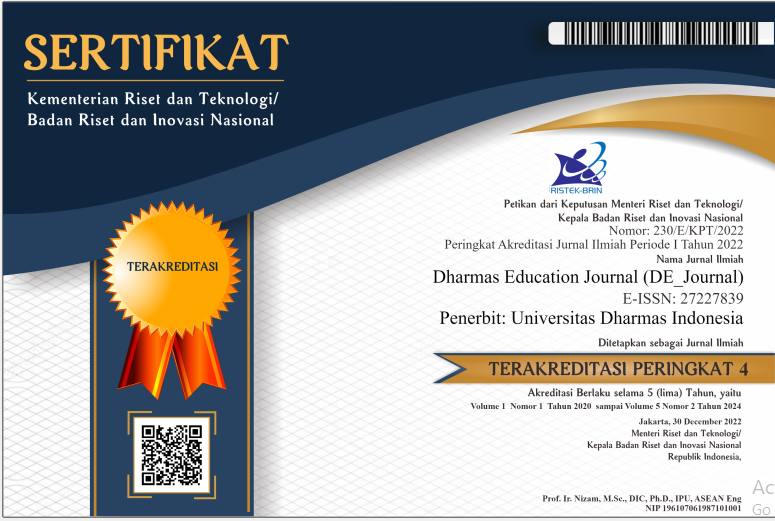A RELATIONSHIP BETWEEN KNOWLEDGE INSPIRATION, LANGUAGE PROFICIENCY AND LESSONABILITY
DOI:
https://doi.org/10.56667/dejournal.v2i1.251Abstract
This study is expected to discover: (1) There is a relationship between of knowledge inspiration and language proficiency; (2) There is a relationship between language proficiency and lesson ability and (3) There is a relationship between knowledge inspiration, language proficiency and lesson ability. The study is directed by January – April 2019 in the second semester understudies, scholastic year 2018-2019. The information of the exploration is gathered utilizing survey to gather the information of understudies' knowledge inspiration and experiment to gather the information of language proficiency and lesson ability. The data are then being explored utilizing basic connection and various straight relapse. The study discoveries show that (1) There is a positive relationship in the midst of knowledge inspiration and language proficiency (ry1 = 0.745> r table = 0.205); (2) There is critical positive relationship between language proficiency and lesson ability (0.720 > 0.205; (3) There is a positive relationship between knowledge inspiration, language proficiency and lesson ability (F perception 91.941 > F table 3.11).
Downloads
References
Anne, E. (2014). Reading for Meaning: Skills Development for Active Reading. Longman.
Arikunto, S. (2012). Prosedur Penelitian: Suatu Pendekatan Praktik. Rineka Cipta.
Cabaroglu, Neseand Yurdaisik, A. (2014). University Instructors’Views About and Approaches toReading Instruction and Reading Strategies. Matrix, Vol.8,No.2. www.readingmatrix.com/articles/nese/article.pdf
Chen, K. (2011). The Impact of EFL Students’ Vocabulary Breadth of Knowledge on Literal Reading Comprehension. Asian EFL Journal, 51. Professional Teaching Articles– CEBU Issue. Vol. 51 April2011.
Fazalur, Rahman, Nabi Bux Jumani, and A. B. (2014). Motivating and De-Motivating Factors Among Learners. International Journal of AcademicResearch, 2,No.1. www.ijar.lit.az.
Guthrie, John T., Allan Wigfield, Pedro Barbosa, Kathleen C. Perencevich, A., & Taboada, Marcia H. Davis, Nicole T. Scafiddi, and S. T. (2014). Increasing Reading Comprehension and Engagement Through Concept Oriented Reading Instruction. Journal of Educational Psychology, 96, No. 3, 403–423.
Hatch, E. and C. B. (2013). Vocabulary, Semantics, and Language Education. Cambridge University Press.
Johnson DW & Johnson, R, T. (2011). Learning Together and Alone. Massa Chussett.
Langan, J. (2014). English Skills (7th ed.). McGraw-Hill Companies, Inc.
Linse, C. T. (ed. . (2016). Practical English Language Teaching: Young Learners. McGraw-Hill Companies, Inc.
Manser, M. H. (2012). Oxford LEARNER’S POCKET DICTIONARY New Edition. Oxford University Press.
Marine, C.-M. (2011). , Teaching English as a Second or Foreign Language. Inc. Thomson Learning.
Mc Carthy, M. (2014). Vocabulary. Oxford University Press.
Narayan, R. . (2012). Some Factors Affecting English Learning at Tertiary Level. Iranian Journal of Language Studies (IJLS), 2(4), 486. http://www.ijl.net/volemes/volume2issue4/narayan1.pdf
Nanda, D. W. (2019, September). The Effectiveness of Cooperative Integrated Reading and Composition (CIRC) Technique on Students’ Reading Comprehension. In Proceedings of the International Conference on Education (Vol. 5, No. 1, pp. 8-20).
Nunan, D. (2013). Collaborative Language Learning and Teaching. Cambridge University Press.
Pang, E.S, A. Muaka. E. B. Bernbardt, M. L. K. (2013). Teaching Reading (Education). PDF book.
Rena Mahardika Mar’atusSholihah, dkk. (n.d.). Meningkatkan Motivasi Belajar Fisika Siswa Kelas X MIA 6 di SMA Negeri 2 Banjar masin melalui Strategi ARCS dalam Setting Pengajaran Langsung. Program StudiPendidikanFisika ULM.
Richards L., Jack., R. A. W. (2012). Methodology in Language Teaching. Cambridge University Press.
Rost, M. (n.d.). Generating Student Motivation. www.longman.com/worldview
Slavin, R. E. (2013). EducationalPsychology:TheoryandPractice. pearsonEducation,Inc.
Sugiyono. (2012). Metode Penelitian Pendidikan Pendekatan Kuantitatif, Kualitatif, dan R&D. Alfabeta.
Webster, M. (2013). Merriam Webster’s Collegiate Dictionary. Merriam Webster Incorporated.
Winkel, W. S. (2015). Psikologi Pendidikan dan Evaluasi Belajar. PT. Gramedia Pustaka Utama.
Downloads
Published
How to Cite
Issue
Section
License
Copyright (c) 2021 DE_JOURNAL (Dharmas Education Journal)

This work is licensed under a Creative Commons Attribution-NonCommercial-NoDerivatives 4.0 International License.
Makalah yang disampaikan diasumsikan tidak mengandung bahan propietary yang tidak dilindungi oleh hak paten















